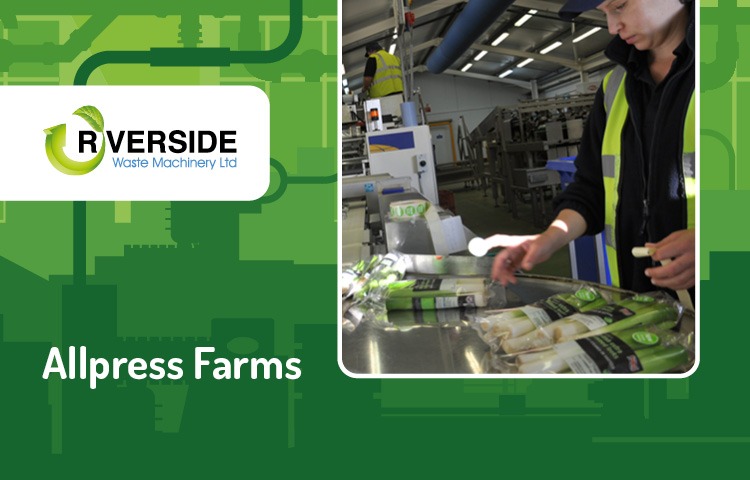The background
 With more than 2,000 acres of land to grow leeks, onions, wheat, sugar beet and maize, it’s no surprise that Allpress Farms takes its environmental commitment seriously. Strong sustainability principles run through the heart of this family-owned business, and have done for more than 50 years.
With more than 2,000 acres of land to grow leeks, onions, wheat, sugar beet and maize, it’s no surprise that Allpress Farms takes its environmental commitment seriously. Strong sustainability principles run through the heart of this family-owned business, and have done for more than 50 years.
From wildlife projects to tree-planting initiatives, Allpress cares about the world around it.
The challenge
Eager to ensure its recycling stance aligns with its wider ‘green’ strategy, Allpress wanted to devise a more environmentally responsible method for handling packaging ‘waste’. Polypropylene film for flow-wrapped veg, polythene stretch wrap, paper and cardboard could surely be diverted from the ordinary waste disposal stream. The challenge was how to process these materials safely and efficiently, so that they could be recycled.
Allpress therefore began its search of the marketplace to assess the type of waste machinery available. A recommendation from a fellow vegetable supplier in East Anglia, brought the team to Riverside.
The solution
 An audit of the type and volume of recyclables typically being handled by Allpress resulted in the recommendation of an RWM 250 vertical waste baler. With a large feed aperture, automatic bale ejection and fitted retaining claws to prevent material spring back, this medium-sized baler would be perfect for Allpress’ varied packing waste. Its neat footprint also meant it could be installed within the production area, to minimise inter-site material transit.
An audit of the type and volume of recyclables typically being handled by Allpress resulted in the recommendation of an RWM 250 vertical waste baler. With a large feed aperture, automatic bale ejection and fitted retaining claws to prevent material spring back, this medium-sized baler would be perfect for Allpress’ varied packing waste. Its neat footprint also meant it could be installed within the production area, to minimise inter-site material transit.
The machine was promptly installed and comprehensive training was provided to ensure it could be operated and maintained with ease. This took place in 2008, and the baler remains in use to date.
The results
In 2015, came the investment in a second RWM 250 for Greenshoots, a producer organisation of which Allpress is a member. With twice the technological capabilities, the business can now process two ‘waste’ streams at once which has further reduced site storage headaches and handling costs.
Currently baling approximately 3.5 tonnes of polypropylene, 2.5 tonnes of polythene and 4.5 tonnes of paper and cardboard a year, Allpress has significantly strengthened its commitment to the waste hierarchy. Financial gains have also been experienced, with landfill and skip charge savings equating to £2,000 per year.
Commenting on his experience of the equipment, Greenshoots Production Manager Stuart Threadgill said: “This technology has slotted seamlessly into our farming operations and now provides us with a robust way to handle valuable materials that other organisations would readily discard as waste.
“I encourage every business, in our sector and beyond, to think about the steps they could take to reduce waste to landfill, strengthen their commitment to the environment and potentially make some savings in the process. We shouldn’t just be driven by legislative compliance – there are even smarter ways to work when it comes to the ‘reduce, reuse and recycle’ mantra.”






